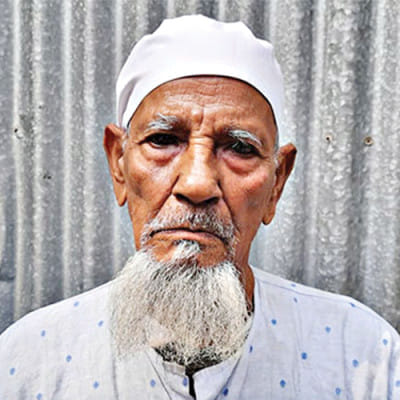‘All I could think of was protecting our mother tongue’

Language veteran Mohammad Ali Akanda is 93 now. When the Language Movement got underway in erstwhile East Pakistan, Akanda was a still a student of Dhaka University.
As the wave of protests shook the capital, he could not keep himself from being swept by its promise.
"At a meeting in the campus in the first week of February, we were asked to return to our localities and organise," Akanda told this correspondent recently.
A resident of Mymensingh, he went back home immediately, and started to gear up along with some friends -- Elias Uddin, Abu Bakar Siddique, Abul Khorsehd Khan, Abdul Wahab Master, Monir Uddin, Abdul Salam Sarker, Abdul Mannan Bhuiyan and more.
Soon enough, they were running campaigns to get students and people of the district on the same page.
But then the movement hit its peak, and Akanda had to return to Dhaka. After a tumultuous couple of days, he got arrested.
Fortunately, he was released on bail after three days, as final examination was scheduled to start in March.
The stories are 69 years old now, and they must have been dulled by the many years Akanda has lived.
But as he retold them to this correspondent, they felt as fresh as a tale from yesterday. "I can still feel that thrill," Akanda said with his eyes gleaming.
Now a reputed school teacher, writer and researcher, he lives at his Durua village home in Chandipasha union of Nandail upazila in Mymensingh. He's become a well-respected figure across the district, owing to both his outstanding contribution in the Language Movement and achievements that followed it.
After graduating from Dhaka University, he joined Mohan Chand High School as an assistant teacher in 1954, working there all the way till 1963.
He later joined Nandail's Chandipasha High School and went on to retire in 1991.
With his credentials and connections, Akanda could have easily gone for the safety of a government job, but he said he made a conscious choice by going for teaching.
"He was an ideal teacher in all respects," chimed 80-year-old Liberation War veteran Abdus Salam Bhuiyan, Bir Pratik.
Now happily retired, Akanda lives with his 80-year-old wife Monjila Khatun, and they are taken care of by their children.
One of his sons, retired army personnel Shafiqur Rahman Akanda, said he and his siblings are proud of their father.
"We feel proud when people praise our father for his contributions [to the Language Movement]," he said.
For his contributions and writings, Akanda was honoured by the Islamic Foundation, HR Foundation, and Sheba Foundation.
On this year's Ekushey February, Bangladesh Institute of Nuclear Agriculture in Mymensingh honoured Akanda at a ceremony held at its auditorium.
"Akanda is a great soul. I think he deserves the Ekushey Padak," said Arbinda Pal, a teacher at the Nandail's Samurta Jahan Mohila Degree College.
But Akanda didn't seem to care much for recognition -- his glorious past is reward enough for the almost-centenarian.
"I was young. I was vigorous. All I could think of was protecting the honour of our mother tongue from the tyrants' oppression," he said with a smile.
"I'm glad that I took that choice to be a part of the movement," he told this correspondent.

 For all latest news, follow The Daily Star's Google News channel.
For all latest news, follow The Daily Star's Google News channel. 



Comments